Ism, Ism, Ism: Altered Surfaces
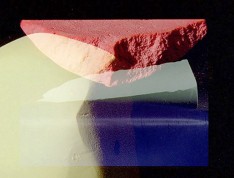
As without so within, by Manuela de Laborde
Sunday October 18, 2020, 7:00 pm
Los Angeles Filmforum presents
Ism, Ism, Ism: Altered Surfaces
Online, hosted by Los Angeles Filmforum
Q&A on Sunday October 18, 2020, 8:30 pm PDT with co-curator Jesse Lerner and filmmakers Claudio Caldini and Manuela de Laborde!
INFO: www.lafilmforum.org, 323-377-7238
Abstraction has been a recurring strategy in Latin American visual cultures since long before the European Conquest. Over the past century, and often in dialogue with artists elsewhere, Latin Americans working in diverse media have explored abstraction or “pure” explorations of color and form. Not surprisingly, filmmakers have participated actively in this process of exploration, often in collaboration with artists from other media. Enrique Pineda Barnet’s Cosmorama (1964) uses the kinetic sculptures of the Romanian-Cuban artist Sandú Darié Laver as a point of departure,. Other filmmakers proceed from urban and architectural references, such as the Cathedral of Notre-Dame in Teo Hernández’s Nuestra señora de Paris (1981-1982), and render these in ways that cross back and forth between abstraction and recognizable representations, while still others reference the altered sensory perceptions and exaggerated color palettes of psychedelic experiences. Offering an abstract journey into theatrical spectatorship, the images in Manuela de Laborde's As Without So Within document reflective prop-sculptures, which are transformed into tools for creating visual fields. Together, like the diverse approaches of the concrete, neo-concrete, geometric abstraction, “grupo Madí,” “grupo Ruptura,” and other movements in the visual arts, these filmmakers pursue colors, light, shadows, and forms as the basis for their work.
Tickets: Sliding scale, $20, $12, $8, $5, $0, at https://alteredsurfacesonline.bpt.me
For more information: 323-377-7238 or www.lafilmforum.org
Total running time: 75 min.
-----
Claudio Caldini (Buenos Aires, Argentina, 1952) has been making experimental films since 1970. A major force of Argentine and Latin American experimental cinema for 45 years, Claudio Caldini was an active member of the "Cine Ex" group, which met at the Goethe-Institut in Buenos Aires between 1974 and 1983 to promote the production and screening of as well as lecturing on experimental film. His exploration of the freedom that Super 8 provided to filmmakers made him claim in 1978 that cinema was discovering new possibilities: “Super 8 imposes another relationship with cinema, from conception to screening. It allows for unknown exhibition circuits.” Locating Caldini's work within an historical period or geography can be as misleading as attempting to approach his films from a discursive logic, as his work explores audiovisual areas of perception that are inaccessible to the discursive flow of grammar. Although fundamentally cinematographic, the experience of Caldini's work is like tonal music or like the rhythm of poetic respiration. As such, Caldini’s oeuvre may be described as that of a personal filmmaker who aspires to an experience that transcends both the categories of filmmaker and spectator.
Manuela de Laborde is an artist and filmmaker from Mexico City. Laborde’s practice, by abstracting concepts from their concrete properties, looks to create [virtual] spaces and [regenerate] the image. Inspired by simplicity of expression, economy of detail, location of exhibition, her practice is a meditation on physical presence. To the eye, her work carries aesthetic claims and pleasure; yet in its presentation is performative and in its purpose, conceptual. In 2012 she exhibited her solo show, Maquettes, in Generator Projects, Dundee; in 2013 screened, Sun, at London MexFest with the live score of Camila Fuchs; her short films Viveros, The exponential Nature of Images and Le Visible et L’Invisible where shown at Antimatter FF, Jihlava IDFF and Milwaukee UFF; and this year her thesis film, As Without So Within, was screened at Toronto International Film Festival, Winnipeg WNDX (Best International Short), 25fps Festival in Zagreb (Grand Prix), FICM of Morelia and International Film Festival Rotterdam among others. Manuela studied Film & Video (MFA) at the California Institute of the Arts and an Art (BA) at Edinburgh College of Art.
This screening is part of Los Angeles Filmforum’s screening series Ism, Ism, Ism: Experimental Cinema in Latin America (Ismo, Ismo, Ismo: Cine Experimental en América Latina). Ism, Ism, Ism is an unprecedented film series —the first in the U.S.—that surveys Latin America’s vibrant experimental production from the 1930s through today. Revisiting classic titles and introducing recent works by key figures and emerging artists, Ism, Ism, Ism takes viewers on a journey through a wealth of materials culled from unexpected corners of Latin American film archives. Key historical and contemporary works from Argentina, Brazil, Bolivia, Chile, Colombia, Cuba, Ecuador, Mexico, Paraguay, Peru, Uruguay, Venezuela, Puerto Rico and the United States are featured. The online screenings in Fall 2020 will conclude the touring portion of Ism, Ism, Ism. www.ismismism.org
Ism, Ism, Ism is accompanied by a bilingual publication (from University of California Press) placing Latino and Latin American experimental cinema within a broader dialogue that explores different periods, cultural contexts, image-making models, and considerations of these filmmakers within international cinema.
Ism, Ism, Ism was originally part of Pacific Standard Time: LA/LA, a far-reaching and ambitious exploration of Latin American and Latino art in dialogue with Los Angeles that occurred in 2017-18. Explore more at www.ismismism.org
Lead support for Ism, Ism, Ism is provided through grants from the Getty Foundation.
Significant additional support comes from the Andy Warhol Foundation for Visual Arts, the National Endowment for the Arts, and the Mike Kelley Foundation for the Arts.
Pacific Standard Time is an initiative of the Getty. The presenting sponsor is Bank of America.
Promotional Support for these online screenings from Berkeley Art Museum * Pacific Film Archive; WNDX Festival of Experimental Film, Winnipeg; Experiments in Cinema, Albuquerque; Lightbox Film Center, University of the Arts, Philadelphia.
---------------------------
Los Angeles Filmforum screenings are supported by the Los Angeles County Board of Supervisors through the Los Angeles County Department of Arts & Culture, the Department of Cultural Affairs, City of Los Angeles, the Wilhelm Family Foundation, the Academy of Motion Picture Arts & Sciences, and the American Cinematheque. We also depend on our members, ticket buyers, and individual donors.
Los Angeles Filmforum is the city’s longest-running organization dedicated to weekly screenings of experimental film, documentaries, video art, and experimental animation. 2020 is our 45th year.
Memberships available, $75 single, $125 dual, or $40 single student. Contact us at lafilmforum@yahoo.com. www.lafilmforum.org.
Become a fan on Facebook and follow us on Twitter @LosAngFilmforum #lafilmforum and on Instagram @lafilmforum 
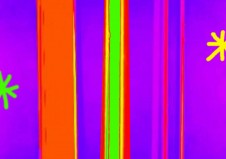
Cocktail de rayas
Cocktail de rayas
Eduardo Darino
1964, 1:41, Uruguay
Eduardo Darino, Uruguayan, celebrates his 55 years making animated films, from the analogue to the digital era. At 18 he saw Norman McLaren’s films at Cine Club del Uruguay and made “Creacion” drawing directly on films, which received a Diploma in the Annecy Film Festival followed by “Cocktail de Rayas” and “Sombras sin Luces” which made a strong impression in McLaren who wrote Eduardo several letters and invited him to visit the National Film Board in Canada. www:darinofilms.com https:vimeo.com/darinofilms
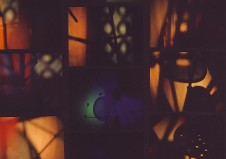
Cosmorama
Cosmorama
Enrique Pineda Barnet
1964, 5 min., 35mm film transferred to digital, color, sound, Cuba
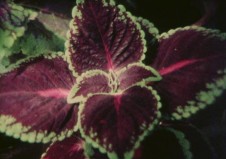
Vadi-Samvadi
Vadi-Samvadi
Claudio Caldini
1976, 1981 remake, Super 8 transferred to digital, color, 7 min., sound in magnetic track, 24 f/s, Argentina.
Music by Shivkumar Sharma (Raga Hamsadwhani)
Second part of a trilogy. A self-portrait and an essay on the motorization of images. The grammar of Indian classical music suggests the emergence of a micro-interval in cinematic space-time.
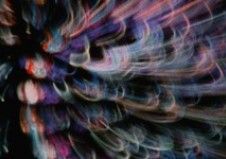
Nuestra señora de Paris
Nuestra señora de Paris
Teo Hernández
1981-1982, 22 min., 16mm, 18 fps, color, sound, France
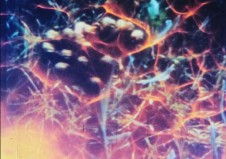
El Quilpo sueña cataratas
El Quilpo sueña cataratas
Pablo Mazzolo
2012, 11 min., color, sound, Super 8 projected as digital file, Argentina.
According to the Comechingones natives, Quilpo river dreams of big falls at least once a year. Whoever is near the river at the time will be part of its dreams forever. Shot in the sacred Comechingones’ shrine. Edited by contact printing and direct light through glass.
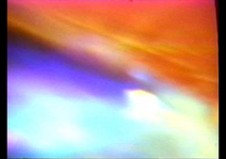
Becky's Eye
Becky's Eye
Willie Varela
1977, 4 min, color, silent, Super 8-on-16mm, U.S.A.
In his early abstract films, such as Becky’s Eye, transforming colored light suggests, at times, a gradient iris, or an inflamed sclera, and even when these rhythms of are slowed, the film remains ambiguous in its content… Such light plays announced one theme of Varela’s filmmaking, the expression of feeling, both spiritual and emotional, and of time, both mythic and present, through a transforming light.—Stephen Broomer
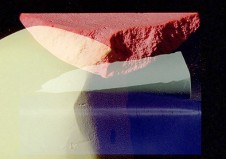
As without so within
As without so within
Manuela de Laborde
2016, 25 min, 16mm, color, sound, Mexico/USA/United Kingdom.
